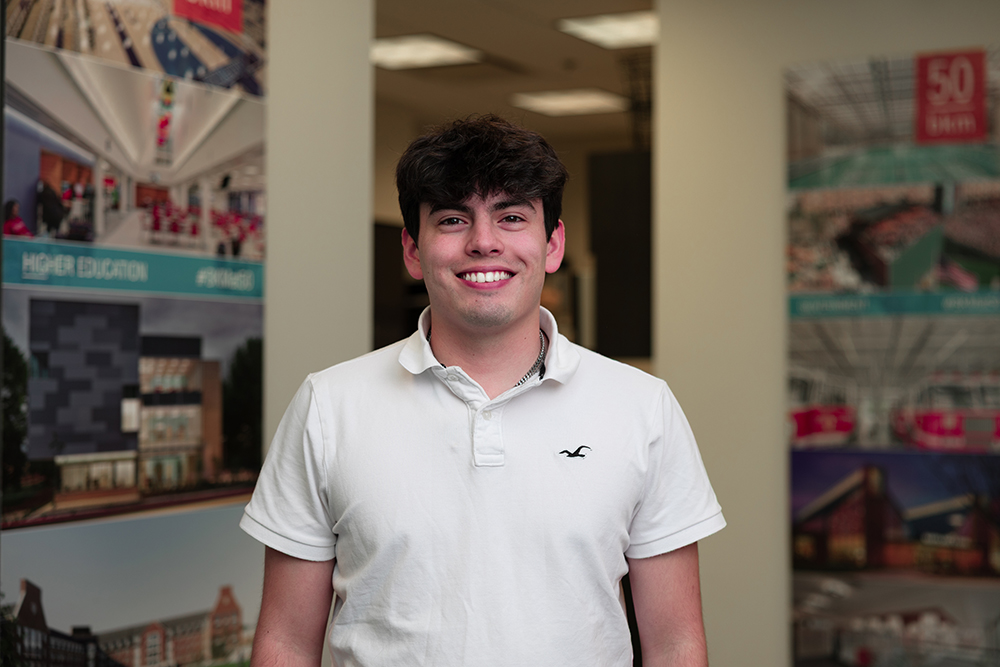Summer break is often a time for students to relax, catch up on course work, and in many cases, pursue an internship.
This summer, Javier Schorle is completing his first engineering internship as an Electrical Intern at Burdette, Koehler, Murphy & Associates.
Javier recently took the time to share his internship experience with the College of Engineering.
College of Engineering: What organization are you interning for this summer and what is your role?
Javier Schorle: I am interning at Burdette, Koehler, Murphy & Associates (BKM). My role is an Electrical Intern in which I assist other coworkers on projects and surveys. The type of work I do is Power Systems Distribution.
COE: What does your average workday look like?
JS: I get into the office around 8 and usually spend the first hour organizing my day/week. For example, responding to or reading emails and teams' messages. Then I work on a project. Depending on the importance, other tasks are prioritized over others. Always some meetings. I have lunch around 12 and work through it while eating. At the end of my day, I recap what I have done so I can log my hours and leave notes and reminders on where I left off the day before. Right across from the office there is a gym that is paid for by my company and then I leave to go home around 6/6:30.
COE: What do you enjoy the most about your internship?
JS: The work environment is the best part. I am working with smart, patient, and nice people. Everyone seems to enjoy being at the company, and the company makes it clear that it cares about the wellbeing of its employees.
COE: How did you learn about this internship opportunity and prepare for the application process?
JS: I learned about the internship through the Temple University Engineering Career Fair. To prepare for the application process, I reviewed my resume to make sure it was up to standard. I prepared questions to ask the interviewer and kept a script-like description of my experience in addition to my extra curriculars.
COE: What courses do you feel most prepared for your internship?
JS: For my internship I had not taken any specific course to prepare me for the type of work I would be doing. However, my engineering classes and previous work experience helped me be able to digest this new knowledge and learn.
COE: How do you think you’ve grown as an engineer during your internship?
JS: As an engineer, I have seen some growth in terms of solo work. In school I find myself doing better in a team. Here, I might work on a project with someone else, but I find myself on a task alone and I have improved my productivity. I have also noticed that I now have better problem-solving skills when I get stuck and can come up with more formulated questions that will help me understand the work I am doing. Professionally I can now be in a workspace with other engineers and contribute to the conversation.
COE: What advice do you have for students trying to secure an internship or who may be starting an internship for the first time?
JS: Do not give up and put yourself out there. A lot of companies will not respond or decline you and that is normal. Having good conversational skills helps. We are engineers so it might take some practice to be comfortable with. Making a connection to remember is always helpful. There can always be something that makes you stand out from others. For example, I was a peer mentor for a 2nd year coding course (ECE 1111). No matter how relevant the actual work was to the job, it seemed like that role and experience were more valuable than the coding knowledge itself. Little things like this can help you stand out from the crowd. My last point is to show interest and be excited about the information you are hearing. Even though you might not be an expert in that field, showing interest and the ability to learn is just as beneficial.
If you are just starting an internship, be sure to absorb as much information as possible. There will be so many new things thrown at you. The more you do the work and walk through the process, the easier everything will feel. Make as many connections within the workplace as possible. Do not be afraid to ask questions. In engineering there could be so much key information that you could not know if you did not ask. Lastly, “SHOW UP” and be present during meetings, conversations and any events that are offered to you by that company. Through this, you will establish connections and healthy friendships in the workplace.

